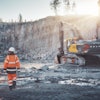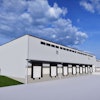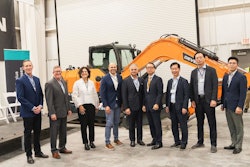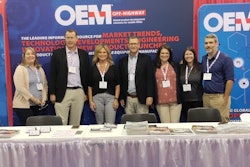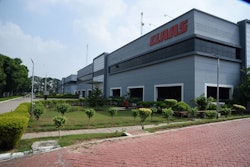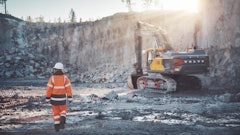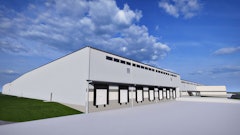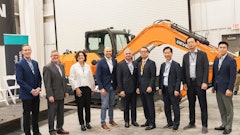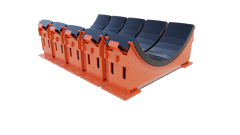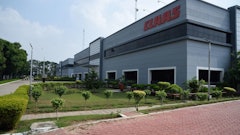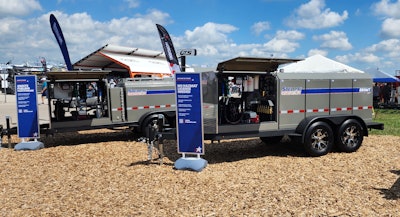
We recently met up with Stellar and Jason Vertin, Stellar’s senior product manager for fuel and lube trailers, who showed us the company’s fuel trailers. Stellar builds work trucks, trailers and accessories at its factories in Iowa and Nebraska. The company was in Boone, Iowa in September for the Farm Progress Show.
Vertin said there is an increasing demand for fuel trailers in the agriculture and construction industries, driven by larger farming operations and jobsites and the need for efficient transportation, as well as efficiency.
The company had its deluxe and multi-tank fuel trailers at the show. Some of their features include:
- Stellar’s FuelMate Fuel Trailers keep equipment onsite, boosting productivity and reducing costs compared to traditional methods. Their adaptable design allows trucks to be used for other tasks while machinery remains conveniently stationed. Featuring DOT-compliant wiring and user-friendly hitches, these trailers provide quick connections to a variety of vehicles.
- Designed for both highways and rugged terrain, Stellar’s Fuel Trailers include independently mounted fuel tanks secured with spring-loaded bolts to minimize vibrations and ease repairs. With solid construction including tubed framing, corner bracing and walking axles, these trailers offer superior strength and stability compared to standard frames. Additionally, the fuel trailers can be equipped with toolbox systems, air compressors and other essential tools to handle onsite maintenance and repairs, further enhancing their versatility and utility.
Check out what Vertin had to say in our Q&A:
OEM: Tell us a little bit about the fuel trailers you brought out to the Farm Progress Show.
Vertin: We’ve got multiple offerings, we’ve got our economy trailers; we’ve got our 990DLX Deluxe, which is our standard trailer for the ag side of things. In the middle, we’ve got our multi-tank trailer, which helps you get around the DOT requirements, where anything over 119 gallons, you have to have a hazmat license. By having multiple 110-gallon tanks, all you have to do is isolate each tank and then you don’t have to have that hazmat license for the commercial side of things. We use spring axles, and everything is powder coated.
OEM: Can you talk about the utility of the trailers and how they improve efficiency on the field or jobsite?
Vertin: The things is, you know, when the crops are ready to come out of the field, we want them to come out as efficiently as they can, so bringing fuel to the farm site obviously saves a bunch of time.
Our DEF tanks are stainless steel, and the fuel tanks are carbon steel.
OEM: What are some of the differentiators that make Stellar different from its competitors?
Vertin: Definitely our spring axles. We also spring mount all of our tanks. The competitor will weld their tanks to the frames. So (with Stellar) you get a little bit more give. It’s not so rigid. That does make it pull a little nicer.
The big deal is, with any trailer, when you're going down the road, or you're going through fields, you know, there's twisting and torquing on the trailer frame and having springs actually helps the tanks not as twisted or torqued on. When that happens you start getting little cracks in your tank.
The other thing is, we’re a little taller by nature, so everything is ergonomically right here, instead of having to bend over.
OEM: Which Stellar trailers are the most popular right now?
Vertin: (Motions toward the 990DLX Deluxe Fuel Trailer) Equipment these days, everything is so big any more, and takes so many gallons. We do sell some 750-gallon trailers but not many; it’s the 990, everyone wants to max out. So, 990 gallons is the largest tank because after you reach 1,000 gallons you have to have a vacuum (pump) tank.
OEM: How big are the operations, typically, that use larger Stellar trailers?
Vertin: Typically, 2,500 acres or more.
OEM: What other industries are using your trailers?
Vertin: Road paving is big for decent fuel transport and storage. And construction, to a point. It’s usually commercial construction guys who are going to be more geared toward this, versus your home builders. Then you have your ag guys. And as funny as it sounds, they’re used a lot in airport work, because the EPA and all of their rules, putting an actual storage tank at an airport, there is a lot of red tape. As long as there are axles under it, you don’t have to do any of that.
OEM: Thanks so much, Justin, for talking with us today.
Vertin: No problem at all.

